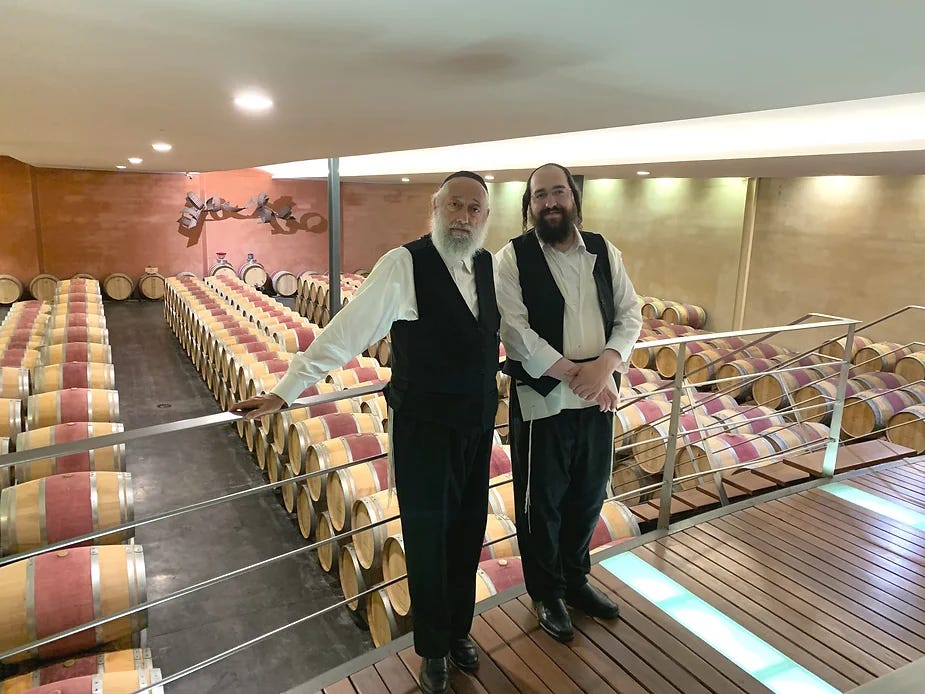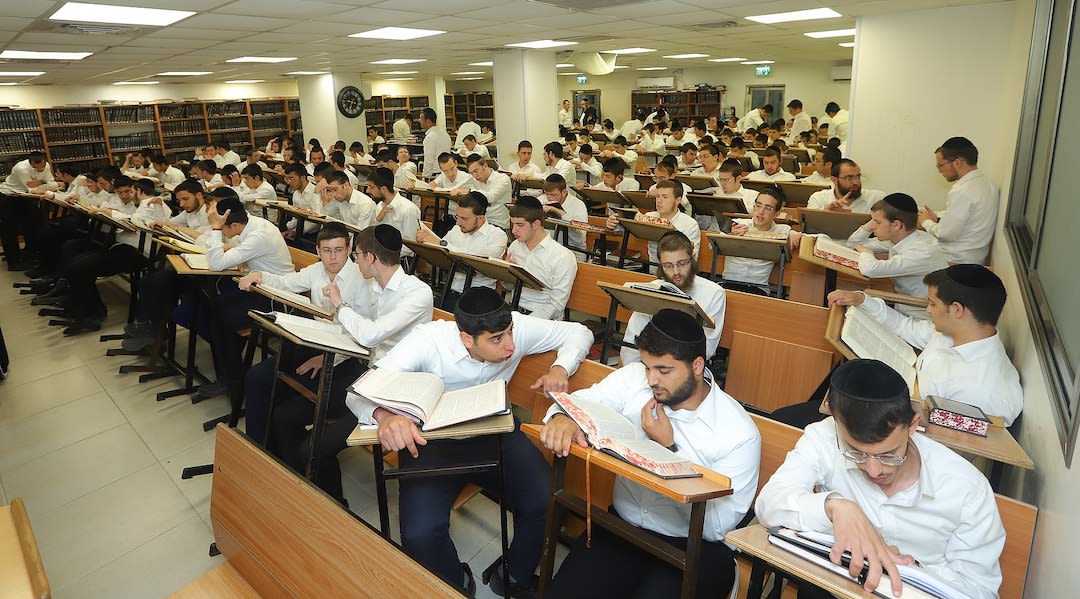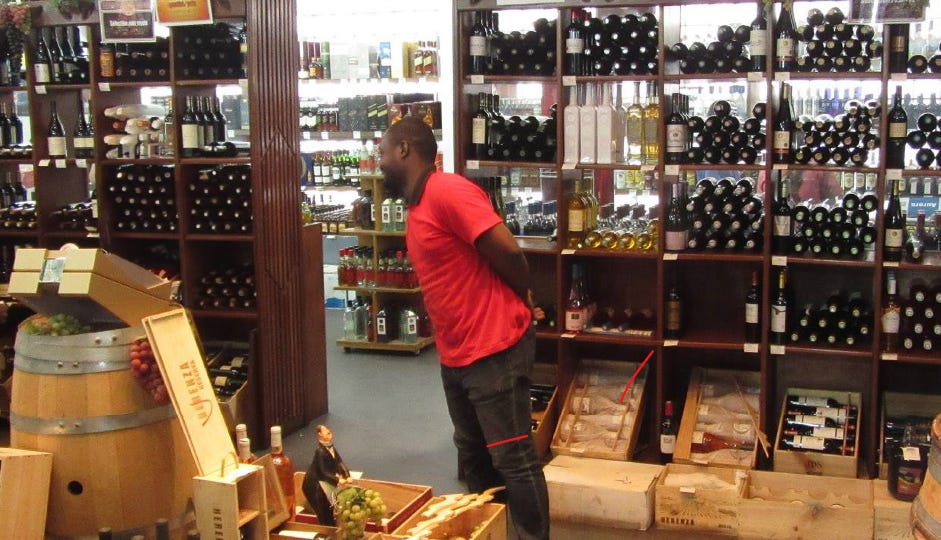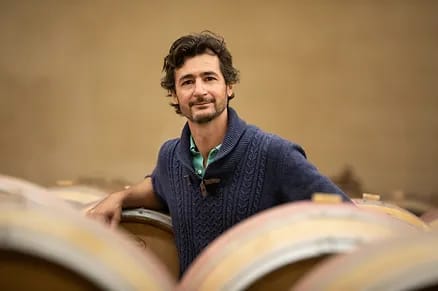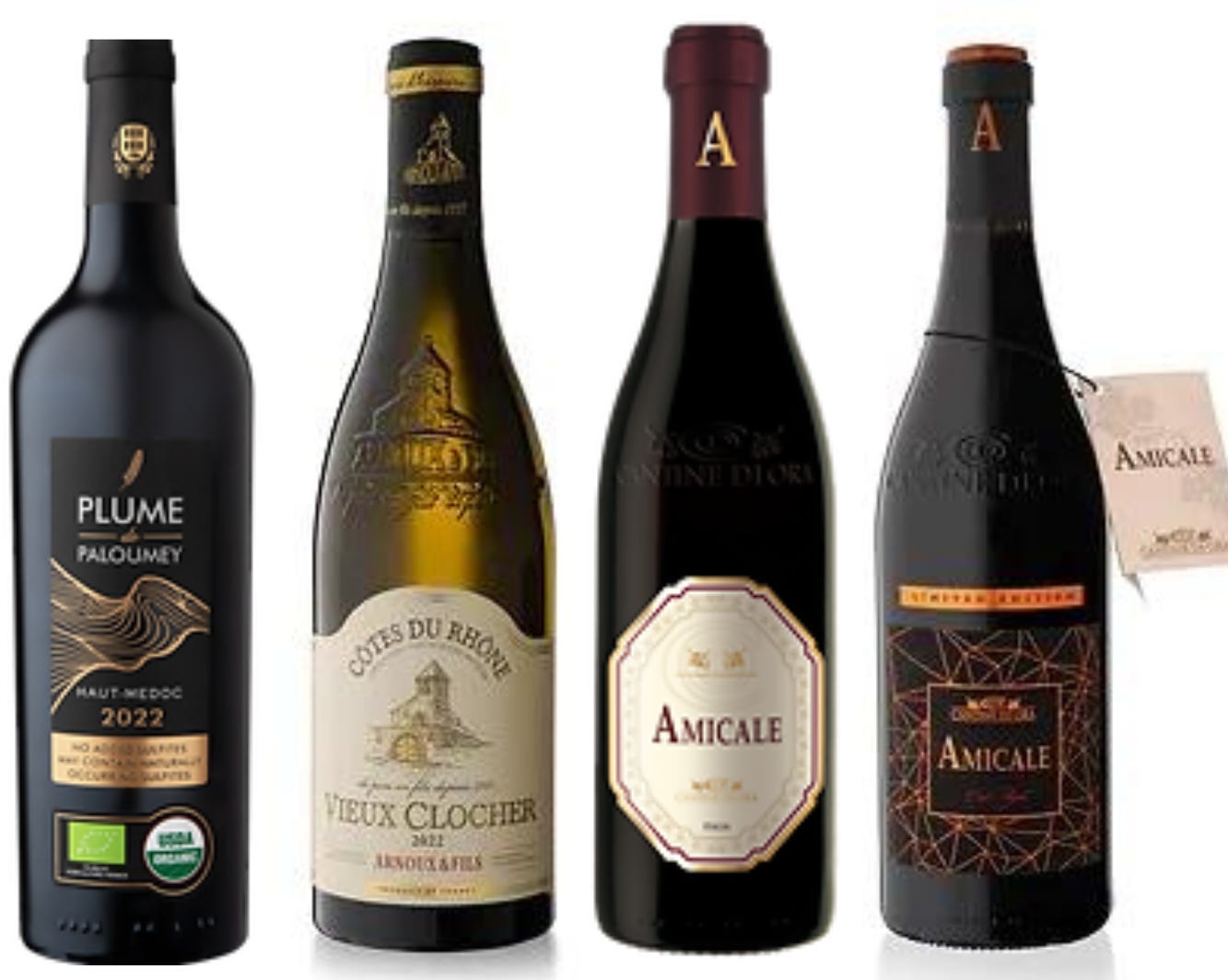European Wines With Uncompromising Kashrut
The story behind CEDEV, Noble Wines, and Monsieur Robby Israel's approach to wine.
NOTE: A shorter version of this article was just published in the 2024 annual Kosher Wine Guide magazine supplement of The Jewish Link of Northern and Central NJ, the Bronx, Manhattan, Westchester, and Connecticut; I am a contributing editor of that magazine.
The Centrale Européenne des Vins (European Wine Center), or CEDEV, is a European kosher wine producer now making a significant splash in the mainstream kosher wine market in America. The founder and director of the company is Robby Israel, and the managing director is Moshe Cik.
Founded in Antwerp, Belgium in 2012, CEDEV currently produces over 60 kosher wines in France, Italy, Spain and Hungary, and exports to 25 different countries. Last summer, Robby’s son, Abraham, launched Noble Wines in New York, which now serves as the exclusive U.S. distributor for CEDEV wines.
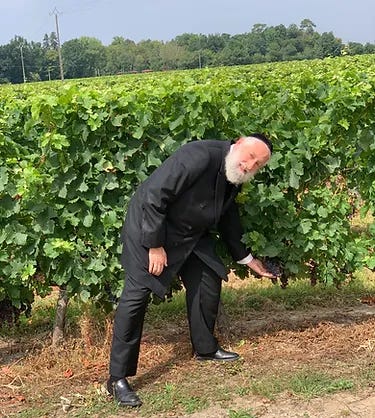
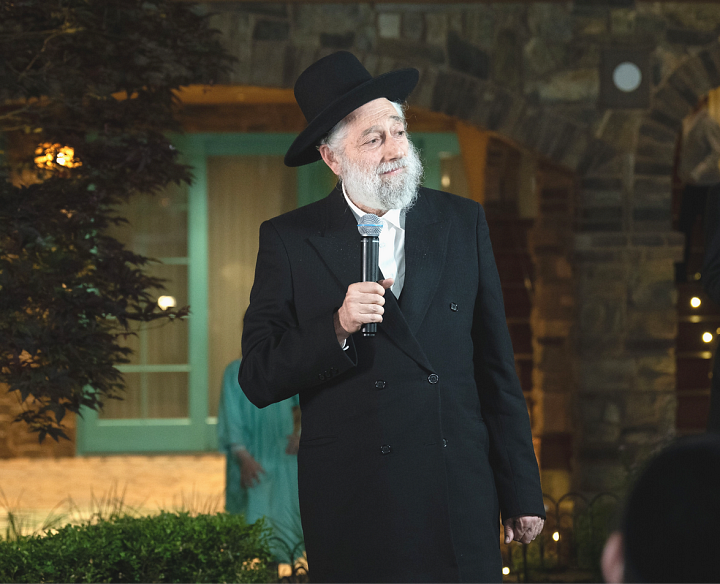
Before launching Noble Wines in America and before starting CEDEV wines in Europe, the Israel family enjoyed a highly successful foray into the commercial production and supply of kosher wines that began nearly 20 years ago in Central Africa, where Robby organized and managed a significant chain of supermarkets.
As one might expect, his clients in Africa were almost 100% non-Jewish. As former European colonies, however, wine culture remained hugely important to his customer base, and they made clear that they were thirsty. Uncomfortable with the prospect of commercial involvement with non-kosher wine, Robby decided at the outset, in 2005, that the only wine he would deal in would be kosher certified.
Although a complicated area of Jewish law, the general issue is the question of whether and to what extent the Torah prohibition of yayin nesech [יין נסך] applies as well to the rabbinic prohibition of stam yeinam [סתם יינם]. That is, whether the biblical prohibition forbidding wine that has been poured for idolatrous worship (yayin nesech) also applies, and to what degree, to the general category of non-Jewish wine about which there is no specific knowledge of its idolatrous use (stam yeinam), which was prohibited by rabbinic edict [both because of the issue of idolatry and also to prevent intermarriage with those outside the community of the faithful]. The central concern is that yayin nesach is assur b’hanah [אסור בהנאה; forbidden to benefit from], which if applied to stam yeinam would preclude all commerce with it.


“One of the dayanim my father consulted,” noted Abraham Israel of Noble Wines, and Robby’s son, “was Rabbi Yitzchak Tuvia Weiss ZT”L [26 August 1926 – 29 July 2022], who was then still the dayan of the Machzike Hadass community of Antwerp, Belgium [in 2004 Rav Weiss became the Gaon Av Beis Din (גאון אב בית דין; His Excellency, Leader of the Rabbinical Court), or GAVAD (גאב"ד), of the Eidah HaChareidis of Jerusalem, in Israel].”


“While one can certainly find kulos [קולות; leniencies] for hetterim [היתרים; rabbinic allowances or permits), Rav Weiss helped clarify the straightforward approach,” Abraham noted.
“I consulted various Sephardishe and Ashkenazi dayanim [דיינים; rabbinic judges],” Robby explained, “and took the decision to be machmir [מחמיר; taking a more stringent approach].”
“The bottom line is that my father simply doesn’t play around with these sorts of things,” Abraham pointed out. “With him, everything has to be 100% in order halachically [in Jewish legal terms] and to his standards, or it is simply not happening.”
Robby feels strongly that maintaining his uncompromising approach has always worked out beneficially in the long term. It has become a personal commitment which he considers part of his successful approach in business—a theme he returned to with great regularity throughout our conversation.
Since the (non-Jewish) clientele desired a diverse yet high-quality range of European wines, and because Robby insisted that the wine his stores carried be strictly kosher, he wound up “creating a fine portfolio of European wines that were also kosher certified”, as Abraham put it, “even though his customers did not require kosher wine.”
As Robby’s business grew, he became the primary source for quality European wines in many far-flung areas. “When the French Embassy or the U.S. Embassy, for example, served wine at their events,” he reminisced, “it was our wine, which is to say it was kosher wine.” In the process, Robby also established good relationships with all the major kosher wine players in the USA and in Europe.
As the wine segment of the markets grew, it did not take long for Robby to create a business of his own that catered exclusively to the kosher market in Europe, and then Israel, and eventually also the USA. Thus, when he decided 12 years ago to launch CEDEV in Antwerp, his ultimate vision was to expand to all the major kosher markets. The launching of Noble Wines last summer was, therefore, part of the original vision.
Once he began producing wines for the CEDEV portfolio, Robby decided once again to stick with his commitment to stringency in kashrut. “Because we were matzliach [מצליח; successful] using this machmir approach from the beginning,” he explained, “we are determined to continue this approach now, despite the sometimes significant financial and logistic costs.”
Since CEDEV’s approach may seem a little burdensome, even within the niche of kashrut production, Robby always strives to establish a true partnership, to, as he put it, “work towards long-term relationships with the partnering wineries.” By which he means
“not just the owners, whose orientation is naturally business-driven, but also the chai director, [that is] the winemaker, who is typically allergic to having strangers, foreigners, poking around his cave and manipulating tanks, pumps and pipes—and to do this correctly and earn their trust and respect is to make a Kiddush Hashem [קידוש השם; sanctification of God’s name].”
Frequently this involves not just sensitive, diplomatic relationship-building efforts, but it also often entails sharing the costs of capital investments to further demonstrate the long-term commitment mindset.
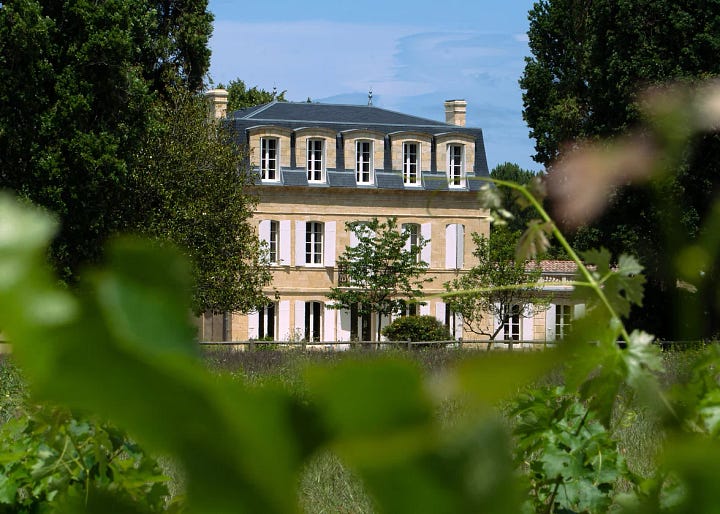
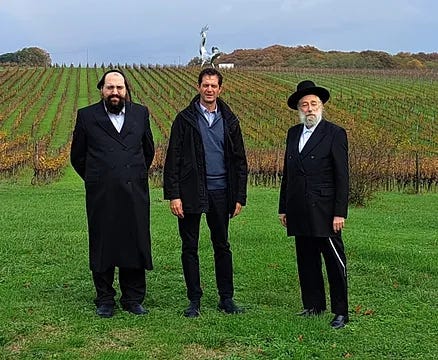
“I love working with Robby because we have a real partnership in creating wine,” said Pierre Cazeneuve, owner and winemaker of Château Paloumey, a dynamic and independent family owned Médoc estate in Bordeaux with a history stretching back at least to the 19th Century.
“Robby has a great philosophy about making wine in that he is very open to new ideas and concepts and engages seriously with my thinking and desired approach, and he really listens.”
Cazeneuve noted that his friends in Bordeaux who have worked with other kosher companies have relationships that, though happy, are more about client fulfillment than real partnership or co-creation. By contrast,
“within our first meeting [Robby and I] knew almost instantly that we would work together, and we even jointly developed our first cuvée together during this first meeting [this was the Plume de Paloumey, an entirely new wine for the estate].”
Cazeneuve emphasized that his approach focuses on making elegant and airy wines that express their terroir, reflecting the place where they were born, while also being in harmony with nature, produced responsibly and sustainably.
As Cazeneuve succinctly put it,
“I try to understand what Robby wants, he tries to understand my thinking and our terroir, and together we decide what to make.”
For Robby,
“I tell my people all the time that we are going to these wineries not just to make wine, and not just to make money, but also to make a Kiddush Hashem. It is very important.”
Today CEDEV produces some 65 different still and sparkling kosher wines from France, Italy, Spain and Hungary.
Some of the more distinctive offerings for the American market are CEDEV’s line of excellent Côtes du Rhône AOC wines from their partnership with the Arnoux family, which has been producing wines since 1717, including the fabulous white Vieux Clocher (a blend of 60% grenache blanc and 40% viognier), and a red Vacqueyras (a terroir-driven blend of 60% grenache, 20% syrah and 20% mourvèdre)—this is the only kosher Vacqueyras in the market.
Also of note is the Plum de Paloumey, the only kosher, high-end, USDA-certified organic red wine from Haut-Medoc (Bordeaux) made with no added sulfites. Paloumey was so pleased with this wine, which was created for CEDEV, they chose to bring it to their mainstream (non-kosher) market as well. From Italy, look for the Amicale Rosso, a unique red made in the appassimento style using a partly dried blend of corvina, rondinella and molinara grapes, and the similarly styled Amicale Corvina, a limited-edition, oak-aged red made entirely from Corvina.
There are, of course, a great many other wines to explore. The full range of CEDEV wines runs the gamut from high-end to budget-friendly and is now widely available in the United States through Noble Wines, the Israel family’s exclusive American importer.
L’chaim!
About me:
By way of background, I have been drinking, writing, consulting, and speaking professionally about kosher wines and spirits for more than 20 years. For over a dozen years I wrote a weekly column on kosher wines and spirits that appeared in several Jewish publications, and my writing generally has appeared in a wide variety of both Jewish and non-Jewish print and online media. A frequent public speaker, I regularly lead tutored tastings and conduct wine and spirits education and appreciation programs. Those interested in contacting me for articles or events can do so at jlondon75@gmail.com.
In what seems like a lifetime ago, I also wrote an entirely unrelated slice of American history: Victory in Tripoli: How America’s War with the Barbary Pirates Established the U.S. Navy and Shaped a Nation (John Wiley & Sons, 2005).
When not focused on wines and spirits, I work in pro-Israel advocacy. Previously a longtime D.C. lobbyist, I relocated with the family to the U.K. during the COVID period and really prefer life across the pond despite the ongoing absurd and frankly uncivilized dearth of kosher Beaujolais here.

